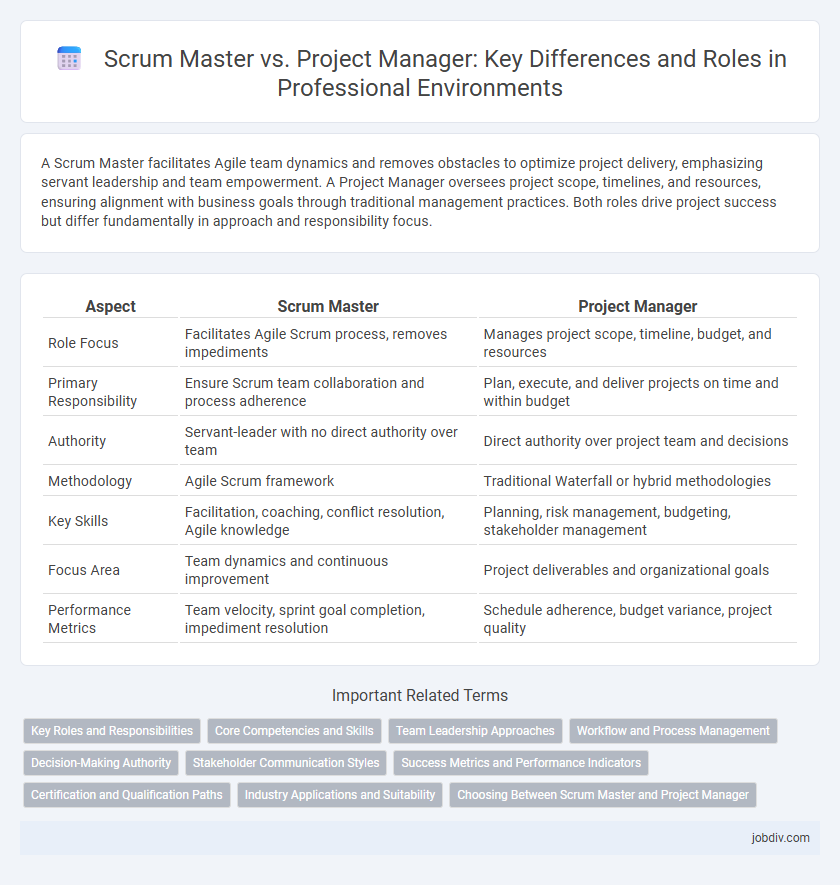A Scrum Master facilitates Agile team dynamics and removes obstacles to optimize project delivery, emphasizing servant leadership and team empowerment. A Project Manager oversees project scope, timelines, and resources, ensuring alignment with business goals through traditional management practices. Both roles drive project success but differ fundamentally in approach and responsibility focus.
Table of Comparison
| Aspect | Scrum Master | Project Manager |
|---|---|---|
| Role Focus | Facilitates Agile Scrum process, removes impediments | Manages project scope, timeline, budget, and resources |
| Primary Responsibility | Ensure Scrum team collaboration and process adherence | Plan, execute, and deliver projects on time and within budget |
| Authority | Servant-leader with no direct authority over team | Direct authority over project team and decisions |
| Methodology | Agile Scrum framework | Traditional Waterfall or hybrid methodologies |
| Key Skills | Facilitation, coaching, conflict resolution, Agile knowledge | Planning, risk management, budgeting, stakeholder management |
| Focus Area | Team dynamics and continuous improvement | Project deliverables and organizational goals |
| Performance Metrics | Team velocity, sprint goal completion, impediment resolution | Schedule adherence, budget variance, project quality |
Key Roles and Responsibilities
Scrum Masters facilitate agile team collaboration by removing impediments, coaching team members on Scrum practices, and ensuring effective sprint planning and review sessions. Project Managers oversee project scope, timelines, budgets, and resource allocation while managing stakeholder communication and risk mitigation strategies. The Scrum Master acts as a servant leader promoting agile values, whereas the Project Manager holds authority over project execution and decision-making processes.
Core Competencies and Skills
Scrum Masters excel in facilitating Agile team collaboration, servant leadership, and removing impediments to project progress, emphasizing adaptability and continuous improvement. Project Managers demonstrate strengths in strategic planning, risk management, and resource allocation, with a focus on meeting project scope, time, and budget constraints. Both roles require strong communication and stakeholder management skills but serve distinct purposes within project delivery frameworks.
Team Leadership Approaches
Scrum Masters prioritize servant leadership by facilitating team collaboration, removing impediments, and fostering an adaptive environment aligned with Agile principles. Project Managers employ directive leadership, focusing on planning, coordinating resources, and maintaining control to meet project timelines and deliverables. The Scrum Master's approach promotes autonomous, cross-functional teams, while Project Managers emphasize structured hierarchy and accountability.
Workflow and Process Management
Scrum Masters facilitate agile workflows by ensuring team adherence to Scrum ceremonies, promoting iterative progress, and removing impediments to maintain a smooth sprint cycle. Project Managers oversee end-to-end process management, coordinating cross-functional resources, timelines, and deliverables to align with project goals and stakeholder expectations. Their workflow focus differs as Scrum Masters optimize iterative team collaboration while Project Managers emphasize comprehensive project planning and risk mitigation.
Decision-Making Authority
Scrum Masters facilitate team collaboration and remove impediments without holding direct decision-making authority over project scope or resource allocation. Project Managers possess formal decision-making power, overseeing budgets, schedules, and strategic direction to ensure project objectives are met. The distinction in authority impacts how teams navigate priorities and accountability within Agile versus traditional project management frameworks.
Stakeholder Communication Styles
Scrum Masters facilitate transparent, frequent, and collaborative communication with stakeholders, emphasizing servant leadership and adaptive feedback loops. Project Managers employ structured, directive communication strategies, focusing on status reports, risk management, and maintaining alignment with project timelines and deliverables. Understanding these distinct styles enhances stakeholder engagement and project success in agile versus traditional frameworks.
Success Metrics and Performance Indicators
Scrum Masters are measured by team velocity, sprint goal achievement, and impediment resolution speed, emphasizing Agile delivery success and team collaboration. Project Managers focus on broader metrics such as project completion on time, budget adherence, and scope management to ensure overall project objectives are met. Both roles use stakeholder satisfaction and risk mitigation as key performance indicators to gauge effectiveness and project health.
Certification and Qualification Paths
Scrum Masters typically pursue certifications such as Certified ScrumMaster (CSM) or Professional Scrum Master (PSM), which emphasize Agile methodologies and team facilitation skills. Project Managers often obtain credentials like Project Management Professional (PMP) or PRINCE2, focusing on comprehensive project planning, risk management, and execution strategies. These certification paths reflect distinct roles where Scrum Masters drive Agile team processes and Project Managers ensure project scope, schedule, and budget adherence.
Industry Applications and Suitability
Scrum Masters excel in agile software development environments where iterative progress and team collaboration drive project success, especially in IT, product development, and tech startups. Project Managers are better suited for traditional industries like construction, manufacturing, and finance where structured planning, risk management, and linear project timelines dominate. Choosing between a Scrum Master and Project Manager depends on industry-specific workflow requirements and the organization's project management maturity level.
Choosing Between Scrum Master and Project Manager
Choosing between a Scrum Master and a Project Manager depends on the organization's project management methodology and team structure. Scrum Masters specialize in agile frameworks, facilitating Scrum ceremonies and removing impediments to enhance team collaboration and iterative delivery. Project Managers oversee broader project scopes, focusing on planning, resource allocation, risk management, and stakeholder communication to ensure project objectives and deadlines are met.
Scrum Master vs Project Manager Infographic

 jobdiv.com
jobdiv.com